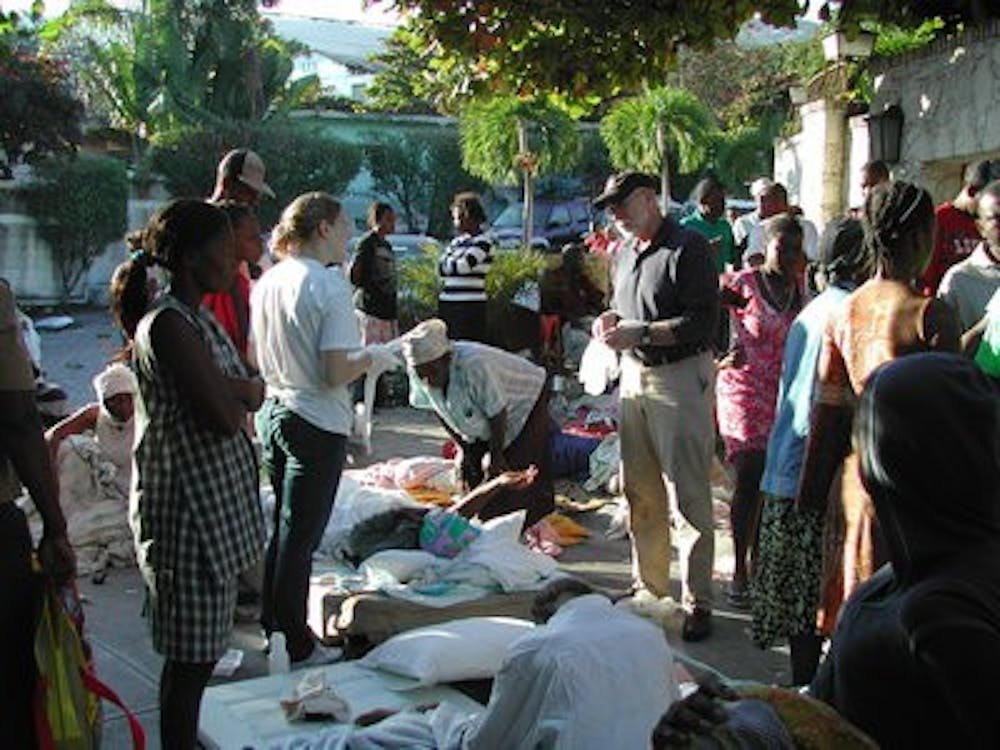Jan. 12, a 7.0 magnitude earthquake struck the island nation of Haiti, with the epicenter 15 miles southwest of the nation's capital city, Port- au-Prince. The United States Geological Survey said the earthquake was the strongest in the area since 1860 and it killed over 110,000 people, according to Haiti's Interior Ministry. While most people in the Auburn community received news of the event from their friends or their preferred news outlet, Dennis Shannon, agronomy and soils professor, experienced it firsthand. "I never thought I would ever be a part of something like that," Shannon said.
Shannon was in Port-au- Prince with agronomy professors from Auburn University and the University of Florida as part of a project to study the Haitian soil and to teach Haitian agronomists new techniques.
The evening of the 12th, a noise that initially sounded like, "a dump truck driving out in the street," turned into the most deadly natural disaster in the Western Hemisphere since Hurricane Katrina. Shannon said when the shingles of the hotel he was in began to fall and the noise of the earthquake escalated to the sound of a freight train he knew he had to get out of his hotel.
After falling twice during his escape from the crumbling building, Shannon said he realized he was in a situation few people ever experience: being stuck in the aftermath of a natural disaster.
"It was worrisome," Shannon said. "Fortunately for me, about two hours after the quake a friend of mine told me a woman in the street had a satellite phone." Shannon used the phone to contact his wife, Louina Shannon.
Louina said her husband's phone call relieved the terrible stress she went through after she heard the news of the earthquake. "I didn't know what to do," Louina said. "I heard a hotel collapsed, but I knew it wasn't his hotel so I was a little relieved but I still wanted to hear his voice. His voice was trembling when he called, but he was all right and that was all that mattered."
After contacting his wife, Dennis went to work with other members of his group giving whatever assistance they could to the injured people outside of the hotel.
Dennis said the team of soil scientists and other able bodied people formed a de facto hospital in front of the hotel by tying up tarps to shade those injured from the heat of the sun.
When night fell, Dennis said people pointed cars towards the makeshift hospital so the headlights could be used to assist those injured, allowing work to continue throughout the night.
"I felt totally inadequate," Dennis said. "My training was cleaning my children's cuts and bruises when they were little kids."
Despite his feelings of inadequacy, Shannon proved invaluable to those around him due to his fluency in the Creole language.
"I got into it gradually by first helping the others," Dennis said. "Then I saw this young woman out there on her own and I said, 'If she can do it, I can do it too.' And of course I had the language skills."
Douglas Coutts, a distinguished visiting pro- fessor and member of the UN World Food Program, said the work of people like Dennis on the ground after a disaster is essential for rescue efforts.
"The first step is to go in and rescue as many people as you can as soon as possible," Coutts said. "There is a short window, about 24 to 48 hours, where those who survived will be alive. The number one concern in a situation like that is food and water."
Dennis said he was disappointed in the response time of governments to give assistance to Haiti.
"I think part of it is bureaucrats were making decisions when you needed people who are used to making emergency responses," Dennis said.
Dennis said the first assistance relief groups he saw were private and religious disaster relief groups. Dennis and his team of volunteers did not have anyone who could stitch a wound on site for three days.
Coutts said the main problem in the UN's response to the earthquake was the fact that the UN was already established in Haiti.
"We lost a lot of UN people," Coutts said. "We had to catch our breath. The first priority for our staff after something like this is their family."
Shannon left Port-au- Prince Jan. 15, three days after the earthquake and two days after he was offered transport back to America.
"I stayed on not knowing how I would leave, but I knew I had to stay," Dennis said.
Dennis said he does not think he deserves any special recognition for his efforts in Haiti.
"I guess this is not different from other catastrophes," Dennis said. "People are just helping their neighbors. There are a lot of unsung heroes out there still digging through the wreckage trying to pull people out, their families, their neighbors."
Do you like this story? The Plainsman doesn't accept money from tuition or student fees, and we don't charge a subscription fee. But you can donate to support The Plainsman.





